OP-ED: CITY-REGION SURVEY
Quality of life declines in Gauteng, deepening inequality
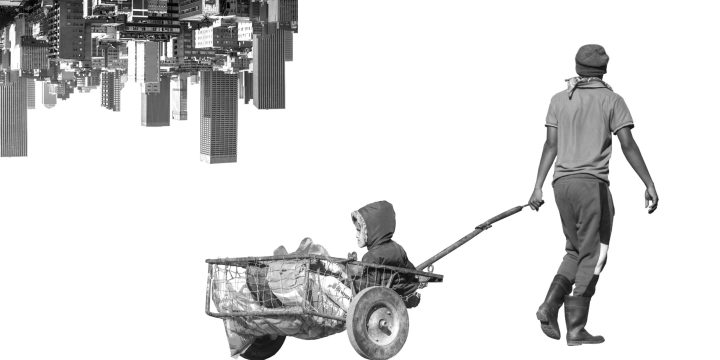
New findings raise concerns that socioeconomic recovery, and recovery in terms of overall quality of life, may exacerbate extreme levels of inequality. Targeted efforts to support the recovery needs of black African women, in particular, are crucial.
New data from the Gauteng City-Region Observatory’s Quality of Life Survey 6 show that in 2020/21 the average quality of life in Gauteng has fallen to levels last seen in 2013/14. This reverses a trend of gradually but steadily increasing quality of life in the province over at least the past 10 years. The recent decrease in quality of life is closely connected to the impact of the Covid-19 pandemic on the province and has affected women and black African residents most severely.
Enhancing quality of life is a core objective of the government and features prominently in political campaigns. But what constitutes a “good life”? And how can Gauteng residents, as well as those within government, assess progress against this objective, and identify areas for intervention when life is not improving?
This is a challenge that the Gauteng City-Region Observatory has been responding to since 2009 through its Quality of Life Survey. Conducted every two years, this survey provides the government and residents of Gauteng with a holistic overview of life in the province, drawn from interviews with randomly sampled adults living in each of the province’s wards. For the Quality of Life Survey 6, 13,616 people were interviewed. The survey documents material living conditions, but also the perceptions, experiences and beliefs of residents.
Drawing on the patterns evident in this data over time, researchers have derived the Quality of Life Index. The Index draws on 33 different survey questions or variables to calculate seven dimensions. Progress in each dimension can be examined, and the seven dimensions can also be grouped, using weights derived from the data, into a single score out of 100. This score provides an indication of the overall quality of life of Gauteng’s residents. It is important to note that any index which combines a large number of variables will change very slowly over time. This means that even shifts of two or three points are indicative of substantial shifts in lived experience.
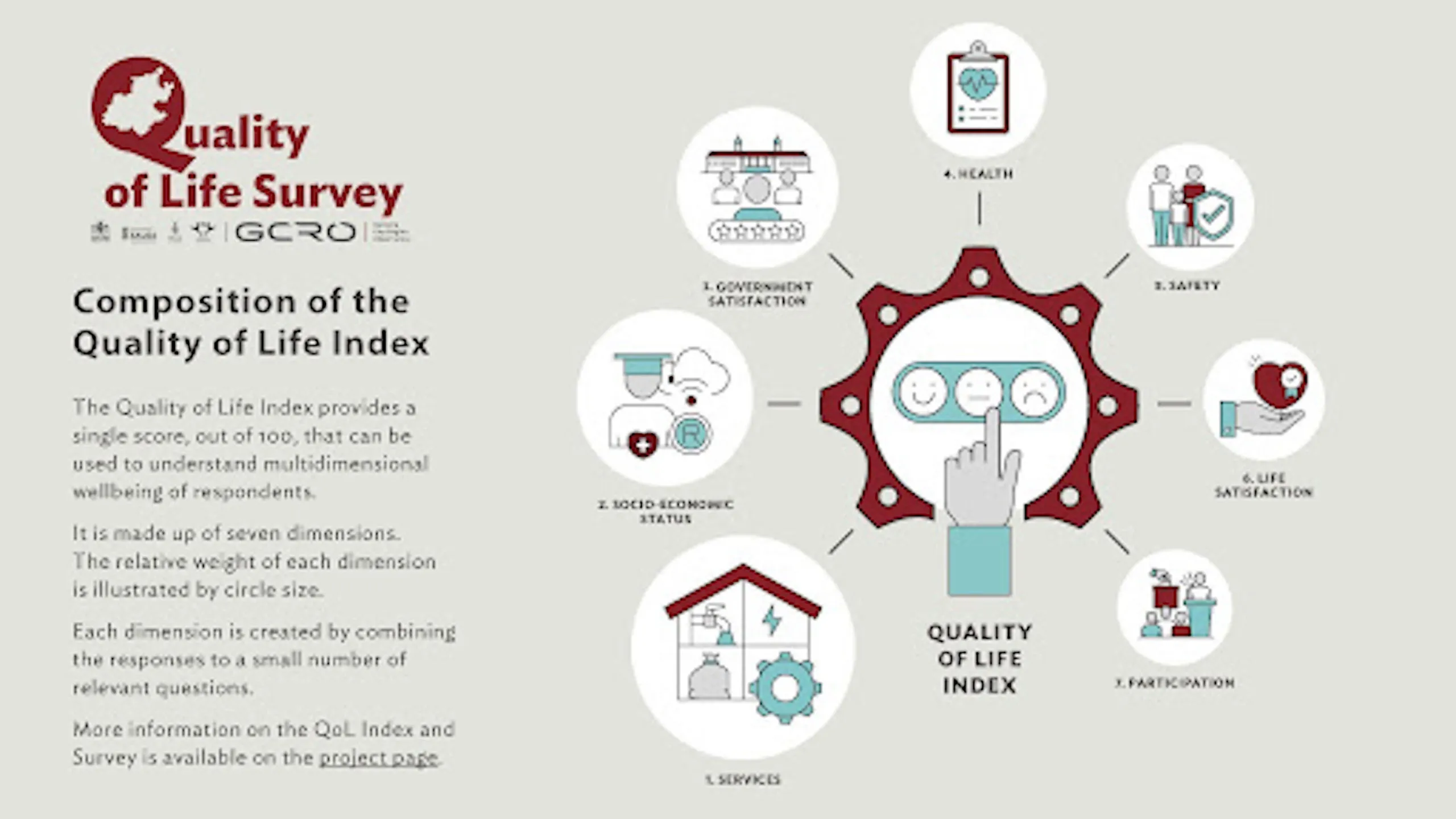
Since the previous survey iteration in 2017/18, women have, on average, seen a bigger decline in quality of life than men. This is probably closely related to the conditions of the pandemic. Research has shown that women have suffered greater job losses and have borne the brunt of additional childcare responsibilities. Additionally, black African residents of Gauteng have consistently had the lowest average quality of life of all population groups since at least 2011, and have experienced by far the slowest increase in average quality of life over time. Due to a comparatively low increase in quality of life over time, they are the only population group that now has, on average, poorer quality of life than in 2013/14. Due to both of these trends, black African women have, on average, been most severely affected by the declining quality of life in the province. Their average quality of life has declined notably from an already very low base.
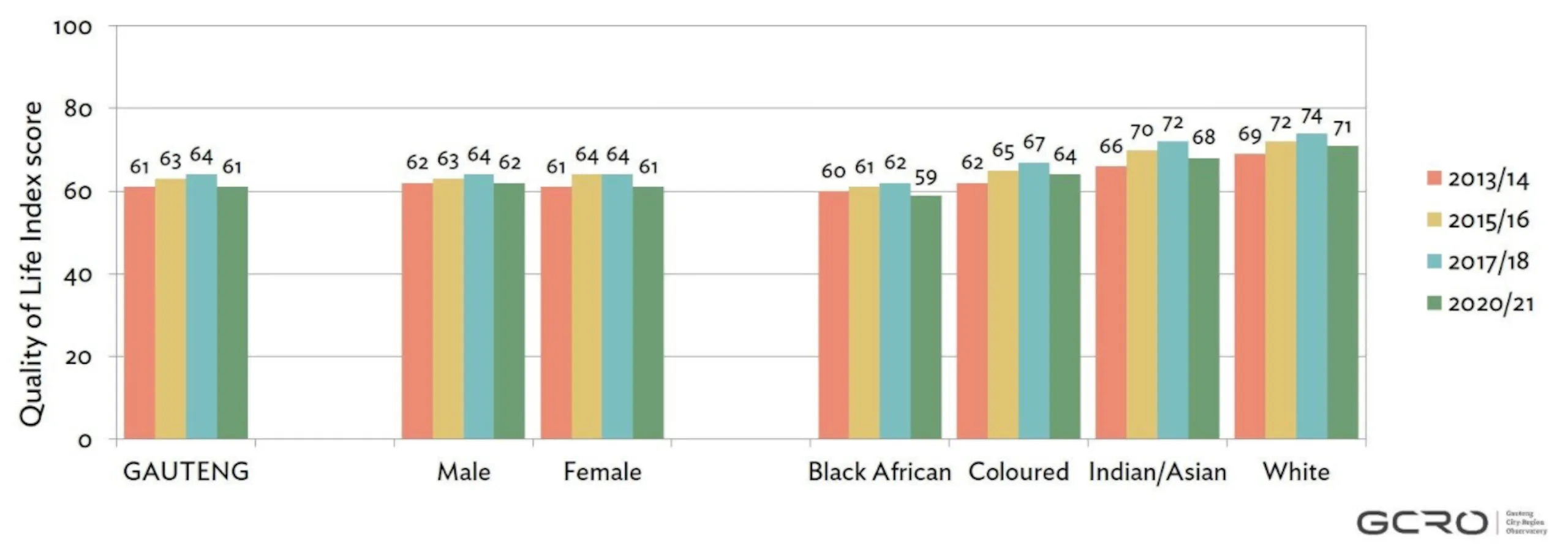
These patterns raise concerns about deepening inequality. Quality of Life Survey 6 data also suggest that among those who lost jobs or businesses since March 2020, men and white residents have been more likely to be able to return to employment. This raises concerns that socioeconomic recovery, and also recovery in terms of overall quality of life, may further exacerbate extreme levels of inequality. Targeted efforts to support the recovery needs of black African women, in particular, are crucial.
There are also notable geographical variations in average quality of life across Gauteng’s nine municipalities. These variations reflect the socioeconomic and demographic composition of the municipalities but are also shaped by the effectiveness of local government in meeting the needs of residents. Since 2017/18, the average quality of life has fallen in every municipality in Gauteng, although the extent of the decrease varies. Emfuleni, Merafong and Rand West already had the lowest average quality of life in 2017/18, and have experienced particularly marked declines of four to five points in 2020/21. They all now share the lowest average quality of life in the province, with an index score of 57 – well below the provincial average.
Midvaal has the highest average quality of life in 2020/21, although this has still fallen by three points since 2017/18. The City of Tshwane is the municipality with the smallest drop in average quality of life, falling from 63 in 2017/18 to 62 in 2020/21.
The Gauteng City-Region Observatory’s interactive Quality of Life Index Visualisation allows users to explore municipal variations over time, and to understand which dimensions are driving change at the municipal level. This information can provide a crucial tool in assessing how to restore quality of life in different contexts across the province.
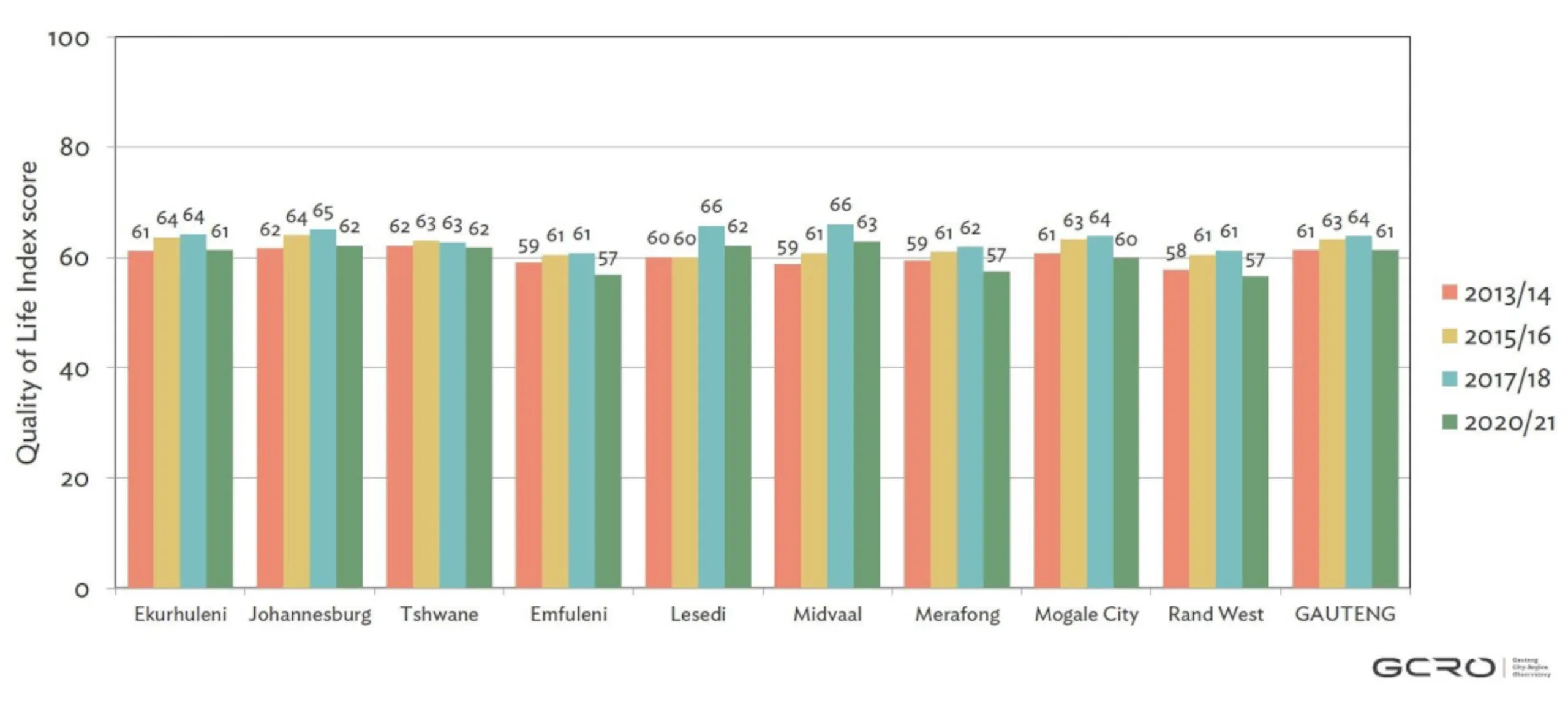
Looking at each of the seven dimensions feeding into the Quality of Life Index provides further insight into areas where action is most needed. The scores for each dimension reveal a dramatic decline in government satisfaction relative to 2017/18. Drivers of government satisfaction are complex and multifaceted, but our data suggest that restoration of trust and confidence in government through tackling corruption will be key. In addition, all spheres of government need to demonstrate that they understand the challenges of residents, and are committed to resolving these.
The socioeconomic status dimension has also decreased markedly – which is unsurprising in the context of the economic devastation the province has experienced. Health and life satisfaction have also fallen, as has participation. None of these changes is surprising in the context of a pandemic, an extensive period of lockdown, and an economic collapse. By contrast, there is a slight increase in services, reflecting relatively high and stable access to basic services and infrastructure (although with some exceptions), despite population growth and a challenging operational context. There is also a slight increase in the safety dimension, even though residents remain extremely concerned about crime and safety. The increase appears to be the result of lower exposure to crime during periods of lockdown.
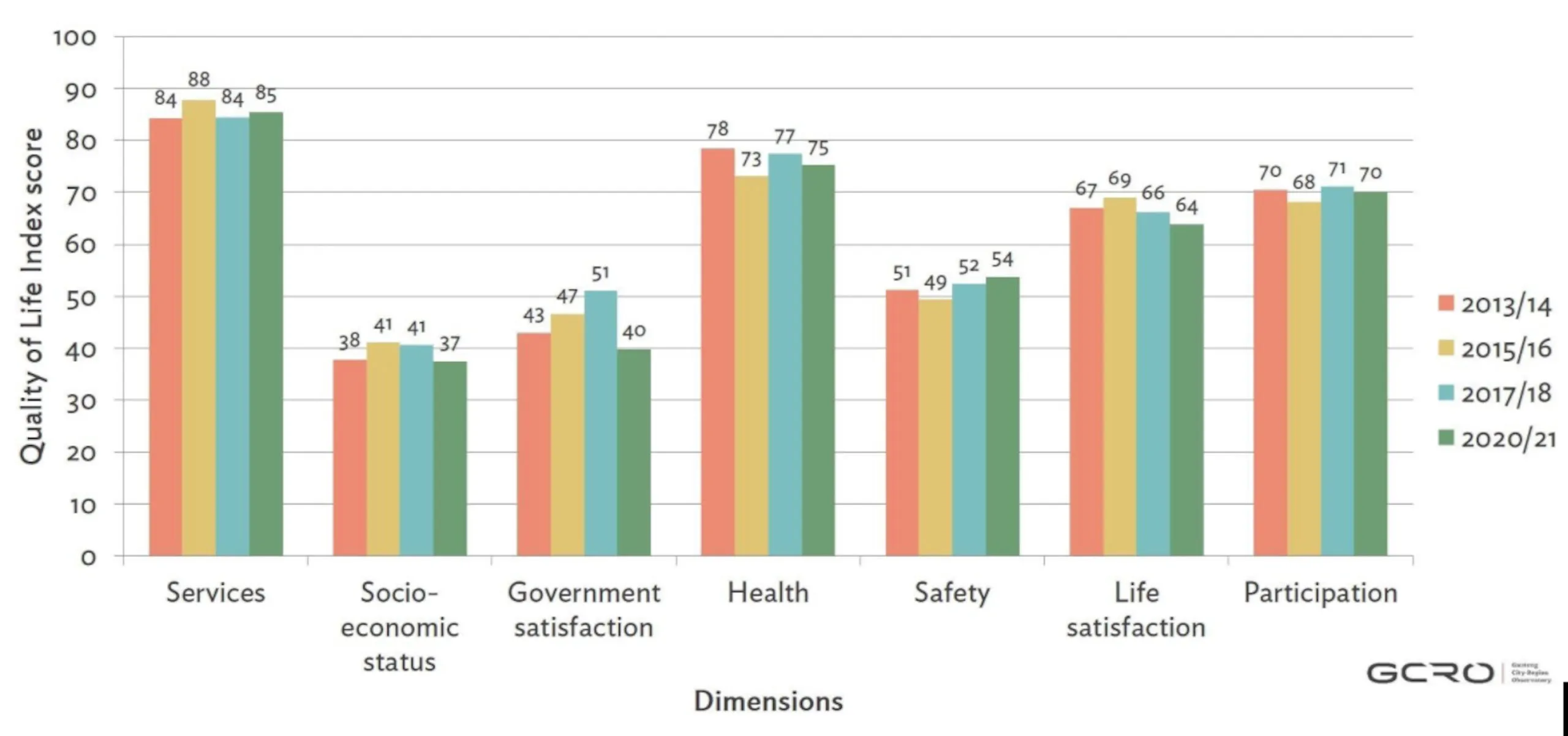
The regular and holistic measurement of quality of life provides a crucial tool for assessing changes in how Gauteng residents experience life in the province. It provides insight into areas of strength and improvement, but also identifies areas of challenge as they emerge. Clearly, current priorities must include the restoration of confidence and trust in government, and enhancing opportunities for socioeconomic recovery. While the pandemic has affected every corner of the Gauteng city-region, some groups of respondents and some municipalities have been disproportionately affected. Identifying and responding to needs in a targeted way is crucial. This is not only important in restoring quality of life in Gauteng, but also critical in beginning to address the deep and growing inequalities prevalent in our society. DM
Acknowledgements: The Quality of Life Index was generated in collaboration with Professor Mark Orkin, Professor Paul Fatti and Samy Katumba.
The writers are with the Gauteng City-Region Observatory.
Yashena Naidoo is a junior researcher at the GCRO. She holds a Masters in Geoinformatics from the University of Pretoria. Her research is in the area of spatial data analytics, methods and informatics to gain deeper understanding of the changes in the GCR’s form. She is also interested in the use of data to create alternate ways of understanding the GCR and the information flows that impact decision making.
Dr Julia de Kadt is a senior researcher at the GCRO, and the principal investigator for the Quality of Life Survey 6 (2020/21). Julia has a strong interest in research methods, including the implementation and analysis of large-scale surveys. She draws on data to better understand post-apartheid South Africa, with a particular focus on issues of quality of life and well-being, health, education, and youth. She holds a PhD from Wits University.
Dr Alexandra Parker is a mid-career researcher grounded in the disciplines of architecture and urban studies, with published scholarship in geography, media and cultural studies, feminist methodologies, identity studies, and visual representation and methods. Alexandra’s research is directed at the everyday practices and activities occurring in the city-region with interests in gender and the urban, suburbia, culture and space, and place identity. Alexandra believes in the power of storytelling and is inspired by recent innovations that combine data, narratives and rich visual imagery.
"Information pertaining to Covid-19, vaccines, how to control the spread of the virus and potential treatments is ever-changing. Under the South African Disaster Management Act Regulation 11(5)(c) it is prohibited to publish information through any medium with the intention to deceive people on government measures to address COVID-19. We are therefore disabling the comment section on this article in order to protect both the commenting member and ourselves from potential liability. Should you have additional information that you think we should know, please email [email protected]"



 Become an Insider
Become an Insider